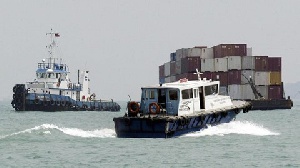More investors are choosing to do business in Ghana as opposed to other regional rivals Nigeria, Cote d’Ivoire and Senegal, as the country implements various reforms at its seaports, construction permits acquisition, and business registration processes.
Last year, the Ghana Investment Promotion Centre (GIPC) recorded US$4.91 billion in foreign direct inflows. For the 2018 financial year, the Centre expects to record US$10billion in investments.
The increased interest in the country over the past few years has been aided by the country’s rankings on the World Bank’s Ease of Doing Business Report for 2019.
The latest report ranked Ghana as the 114th country with the most business-friendly environment, largely on the back of three major reforms—ports, building permits acquisition and business registration.
Ghana was ranked 156 in the trading across borders, scoring 54.84 up from 52.3. The feat was achieved as a result of the reforms implemented at the ports.
This remarkable improvement helped moved the country up six places on the league of progressive economies that institute measures to facilitate businesses.
In 2015, the report cited the reduction in the time to obtain building permits and improvement in trading across borders that served as the major ‘drivers’ for the country’s improved ranking.
The report noted that the country made trading across borders easier by upgrading infrastructure at the port of Tema and bringing on-board WestBlue Consulting to augment the operations of GCNet.
A reduction in the documentary and border compliance time for importing goods, developing of electronic channels for submitting and collecting the final classification and valuation report as the main items that improved the country’s ease of doing business in 2016. That year, also marked the full year of operation of WestBlue Consulting.
See Also: Vodafone equips Makola traders with business skills
In the second full year of the window WestBlue’s operation, 2017, the World Bank’s Doing Business Report said trading across borders have been made easier by removing the mandatory pre-arrival assessment inspection at origin for imported products.
However, starting a business became more costly by increasing the registration and authentication fees and increase the cost of obtaining a building permit were major drawbacks in 2017.
In 2018, dealing with increased transparency in the issuance of construction permits was the major improvement recorded.
For 2019, strengthened construction quality control by imposing stricter qualification requirements for professionals in charge of technical inspections; and importing made easier by implementing a paperless customs clearance processing system are what informed the World Bank’s ranking of 114th position ahead of major regional economies.
The Paperless Port Reforms
The paperless ports reforms, which took-off successfully on September 1, 2017, is aimed at reducing the cost of doing business, enhance transparency and improve the country’s trade competitiveness.
The roll-out of the paperless ports followed Vice President Dr. Mahamudu Bawumia’s directive during a Port Efficiency Conference in Accra.
Dr. Bawumia’s three-point directive included: the removal of all customs barriers on the country’s transit corridor, a joint inspection by all regulatory agencies and a 100 percent paperless transactions at the ports from September 1, 2017.
This was followed up with an official unveiling of a road map of the paperless process to guide the operators and agencies in the port clearance chain; with WestBlue Consulting and GCNet as the IT solutions providers.
This year, a review of the system led to the reduction in the number of agencies undertaking joint inspections at the ports from 16 to three – Ghana Standards Authority (GSA), Food and Drugs Authority (FDA) and Customs Division of the Ghana Revenue Authority (GRA).
Officers from the National Security or Narcotic Controls Board only come in based on intelligence.
The Doing Business Report
The Doing Business Report captures several important dimensions of the regulatory environment as it applies to local firms.
It provides quantitative indicators on regulation for starting a business, dealing with construction permits, getting electricity, registering property, getting credit, protecting minority investors, paying taxes, trading across borders, enforcing contracts and resolving insolvency.
It also measures features of labour market regulation. Although does not present rankings of economies on the labor market regulation indicators or include the topic in the aggregate ease of doing business score or ranking on the ease of doing business, it does present the data for these indicators by gathering and analyzing comprehensive quantitative data to compare business regulation environments across economies and over time, encourages economies to compete towards more efficient regulation; offers measurable benchmarks for reform; and serves as a resource for academics, journalists, private sector researchers and others interested in the business climate of each economy.
These reports provide data on the ease of doing business, rank each location, and recommend reforms to improve performance in each of the indicator areas.
Selected cities can compare their business regulations with other cities in the economy or region and with the 190 economies that have been ranked.
Business News of Tuesday, 6 November 2018
Source: thebftonline.com
Port reforms et al draw investors
 Government aims at digitising the economy, introducing policies to reduce time spent at institutions
Government aims at digitising the economy, introducing policies to reduce time spent at institutions












